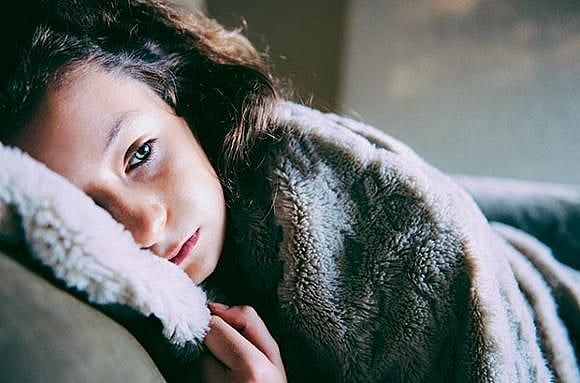Children on antidepressants
Thousands of under-16s in the UK turn to antidepressants for help

Katie-Louise Wilkins refused to get out of bed. It was the start of the week but she was clearly struck by what appeared to be a severe case of Monday blues and was determined not to budge.
‘Just leave me alone,’ she mumbled brusquely when her mother Patricia Wilkins attempted to rouse her. When Patricia tried coaxing her gently to get ready, Katie-Louise buried her face in her pillow and began to sob uncontrollably.
It wasn’t the first time the then nine-year-old displayed worrying symptoms of depression.
In fact, the schoolgirl had begun to show signs of extreme stress when she was in primary school, says her mother. The girl who was so chatty before had quickly become sullen and withdrawn, throwing tantrums frequently. ‘She would refuse to talk to us or share her thoughts on anything, which truly worried me,’ says Patricia, 37, of Gillingham, Kent, UK.
All her attempts to get her daughter talking failed. Patricia just couldn’t understand what had triggered her sudden change in mood.
‘Over a period of two years I watched Katie-Louise’s behaviour get worse and worse, but she would never tell us why,’ says Patricia.
‘She went from being a top student to a disruptive child with low grades and it took me a long time to get to the bottom of her problems.’
‘When I told the doctor everything, he prescribed one spoonful of Fluoxetine every morning to help calm her anxiety. He said this was the only medication that was suitable. At first I thought: “Oh my gosh, I’m putting my little girl who’s just 10 on Prozac.” But then I realised I had to try anything that could help.
‘When he said the drug would probably calm her down, it was a relief, to be honest. He also referred her for counselling as a long-term solution.’
Fluoxetine is a medicine that works by increasing levels of a chemical in the brain called serotonin. It is used to treat depression, bulimia, or obsessive compulsive disorder, comes in capsule and liquid form, and is usually given to adults.
‘The drug seemed to have an immediate effect,’ says Patricia. ‘Three months on, she seemed calmer and less prone to angry outbursts.
‘There have been no side effects such as sickness or tiredness. I feel like I’ve got my little girl back.’
Katie-Louise was just 10 at the time. But she’s not the only child on antidepressants. According to a report in London’s The Guardian, thousands of children as young as five have been diagnosed with depression and those with a severe form number around 80,000 – including 8,000 under the age of 10.
In India psychologists have reported an increase in the number of children who have been treated for depression. Doctors blame increased competition for the rise in performance anxiety and stress among children.
‘Nowadays, a child is not satisfied by being top of the class. He has to top the state and country to be really happy about his achievement,’ psychiatrist Dr Kausar Abbasi said at a conference in Nagpur .
Another psychiatrist, Dr Nilesh Shah, from Sion Hospital in Mumbai, who was also a speaker at the conference, said, ‘In every class, one or two children can be found who suffer from over-anxiety.’
There is much debate about whether young people today are more anxious, depressed and stressed than previous generations. What’s not in dispute is that mental health disorders in young people are surprisingly common.
According to a report in 2013 by The Association for Young People’s Health [AYPH], the most frequent problems in teenage years are anxiety and depression. Getting the diagnosis right can have important implications on their lives, including their ability to engage in education, build friendships, maintain healthy family relationships, and basically get on in the world.
They are worrying figures, made worse by the fact that there is such a lack of recent data on mental health problems in the young, making it difficult to see the current bigger picture.
Sarah Brennan, Chief Executive of the UK charity YoungMinds, says: ‘It is absolutely right to highlight the lack of prevalence data for children and young people’s mental health.
‘We will always struggle to support children and young people with mental health disorders until we know the true scale of the problems that they face.’ Early intervention, she says, is the key to improving the outcomes for children.
For Patricia and Katie-Louise, medication in the form of anti-depressants seemed the only way forward after her daughter refused any offers of talking therapy.
‘I think every case is different when you’re dealing with depression and anxiety in children. Counselling was suggested at first but I think things had gone too far by then. I’m not sure how beneficial it would have been as a first step because she wasn’t opening up to anyone.
‘For Katie-Louise, I think medication was the best way forward because she wasn’t letting anyone in. This approach worked for her and I’m really happy with the way our GP handled it.
‘It was important that the medicine kicked in first before she started counselling. I’ve seen a big change in her while on the medication – she is less anxious and is starting to trust adults again and open up.
‘I’m happy that she’s being properly assessed in this way and monitored and feel really positive that she’ll make a full recovery.’
Sign up for the Daily Briefing
Get the latest news and updates straight to your inbox
Network Links
GN StoreDownload our app
© Al Nisr Publishing LLC 2026. All rights reserved.